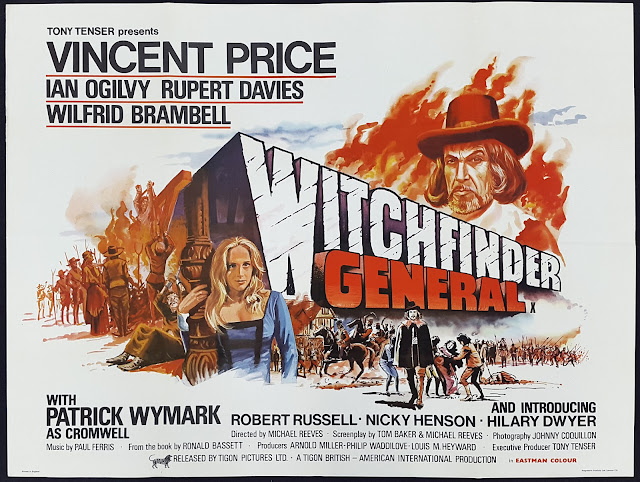Witchfinder General - Coronavirus Blues (II)
The impression you get from someone's name is often misleading. And if you're lacking the appropriate piece of historical knowledge, there's certainly something quite benign about Matthew Hopkins. For me, it conjures up a nice G.P. - he'll tell you the bad news gently and won't be overly harsh on some of the flaws that could have led you to that state; at worst, I'm left thinking that it could be the name of an estate agent. And not a ruthless sales-machine, but rather one with middling results who wouldn't shy away from telling you about the infestation of Japanese knotweed under the shed. That all changed after venturing further down my Coronavirus wormhole, and following up A Field in England with another Civil War horror film, Witchfinder General. My friend Mark suggested it as the perfect accompaniment to A Field In England. I told him that I'd seen it when I was ten but that I would revisit it immediately. Five minutes in, and I realised that I'd not seen it; I'm now quite sure that what I'd seen at that young age was The Devil Rides Out.
 |
| Alan Bennett: "The most persistently sadistic and rotten film I've ever seen!" |
Thirty minutes in and the name of Matthew Hopkins was no longer benign. Although the film takes liberties with what we know of the real life Hopkins, it gets much of the story correct. Hopkins and his torturing sidekick John Stearne were responsible for 60 percent of the 500 executions for witchcraft that took place between the 15th and 18th centuries. That the self-styled Witchfinder General carried out these atrocities in the space of 14 months makes for a staggering and gruesome statistic.
 |
| Great names for your pet. Or your familiar. |
What allowed Hopkins to carry out these executions with such speed and impunity? Simply put, the combination of credulous and frightened rural communities, and the total fracture of society brought on by the English Civil War, made his monstrous crusade possible. Parliament and the authorities knew all about him, but were too preoccupied to act. And whilst I don't want to draw hysterical parallels with Hopkins' short but devastating reign of terror, it is interesting to note that a national crisis does create a space for the views of the self-righteous, the selfish, the bigots (religious and racist) and the utterly idiotic. Already today we've seen Peter Hitchens complaining about the shutdown of the country. And over the past few days we have had the scarecrow pub-overlord Tim Martin proclaiming that he won't be closing any of his branches of Wetherspoons; a television presenter telling people that he won't be self-distancing because he's super-fit and healthy; and the President of the most powerful country in the world regularly contradicting his staff of experts, continuing personal feuds with journalists, and labelling the Coronavirus the 'China Virus' (yes, this virus did originate in China, but conversely the Spanish flu did not originate in Spain and could well have originated from Kansas ... either way, nationalising the source of a virus is reductive and polarising).
 |
| "They swim ... the mask of Satan is upon them. They must hang." |
What Witchfinder General captures brilliantly is the atmosphere of dread and uncertainty that can quickly consume a fragmented and terrified country. Incidentally, although Witchfinder General is billed as a horror movie, it does not contain a single instance of the supernatural. The scene at the moat (pictured above) is one of the most chilling things I have ever seen in a film. There is a great cameo from Patrick Wymark playing a warty Oliver Cromwell, and Paul Ferris's eerie score is a perfect mixture of martial drumbeats and variations on 'Greensleeves'. And because of all this, you can forgive its historical inaccuracies. Hopkins did not die at the hands of a revengeful Roundhead; nor was he middle-aged (although Vincent Price does play him with wonderfully chilling understatement) but rather was cut down, probably by consumption, at the age of twenty-five. Curiously, the film's director Michael Reeves also tragically died at the age of twenty-five less than a year after the film had been made.
Whereto next? Perhaps I should reverse down the wormhole and pursue something with a tinge of optimism. Or I could carry on and work out why I'd confused Witchfinder General with The Devil Rides Out.


Comments
Post a Comment